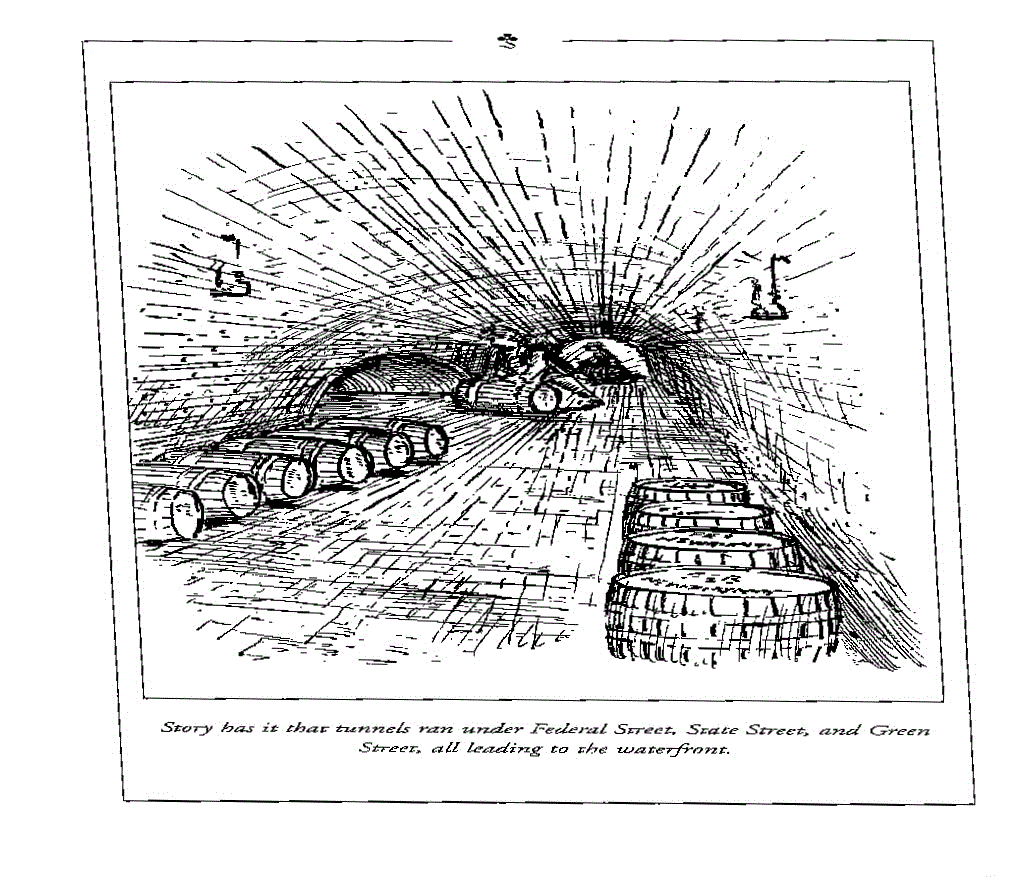Smuggling – Newburyport’s Pre-eminent Industry
I know that making such a statement is of its very nature, controversial; and shocking at the very least. There are volumes about our city’s international trade, rooms devoted to such at the Cushing House; and for the other famous activities by the residents of our city – clamming, inventors, and inventions, privateering, rum manufacturing, ship building, silversmithing and statesmen by the droves. Here was born the clipper ship and, yes; the birth of the Coast Guard.
Why, there would be no birth of our beloved Coast Guard if it wasn’t for Newburyport’s pre-eminent ‘business’.
And yet, there is not one book, or brochure or archival niche in our Library’s records devoted to this topic.
So, why am I bringing this subject to the forefront?
Because there is wide skepticism over the very existence of smuggler tunnels.
We have Victorian historians blatantly passing over smuggling or apologizing for such rude behavior. Today, we’ve got stuff-shirt experts, using today’s modern viewpoint treating smuggling as not even a significant matter in the old Waterside community. This wide skepticism is based on the loudly proclaimed declaration, “How could such an expensive and sophisticated network of tunnels be possible in a law-abiding, religious and proper colonial Newburyport? Where would the know-how and more importantly, the money come from for such an engineering marvel that wouldn’t just pass human cargo but barrels of goods through its passages?”
And this distancing occurs even today. Smuggling is occurring all around us right at this very moment. While we hear of detox centers at the Middleton Jail, Narcon being administered by emergency personnel and the police and the constant news of overdoses and untimely deaths; yet, there is no mention of the very source. A fractured and yet sophisticated network of drug smuggling that is taking Mexican narcotics and efficiently distributing it onto the streets right here in New England.
The very same techniques of smuggling used in our past history are still being used today and with the same potent affects. It Is a cat-and-mouse battle; more smuggling, more law-enforcement; new tricks and new counter-actions by the authorities. Ignore it and it may go away or become larger; attack it and the attack may generate better organized and sophisticated smuggling. Legalize the smuggled goods and it also may go away; or be the staging ground for more advanced smuggling. At the very least, we as citizens need to know how smuggling was at the very core of our country’s beginnings; and how those practices are being used today. More importantly, what works to stop it and what didn’t work by using the lessons of history.
Newburyport had three main era’s where smuggling played an important part in its economy:
Colonial Smuggling 1763 to 1775

 |  |
 |  |
 The Black Duck |
Smuggling References:
Jones, Evan T., ‘Illicit business: accounting for smuggling in mid-sixteenth century Bristol’, Economic History Review, 54 (2001). Winner of the Economic History Society’s “T.S. Ashton Prize” in 2001, freely available online.
Jones, Evan T, Inside the Illicit Economy: Reconstructing the Smugglers’ Trade of Sixteenth Century Bristol (Ashgate, June 2012)
Smuggler Nation: How Illicit Trade Made America, by Peter Andreas, Oxford University Press, New York, 2013.
Smuggling: Contraband and Corruption in World History, by Alan L. Karras, Rowman & littlefield, Lanham, MD, 2010.
“The Colonial Molasses Trade”, by Gilman M. Ostrander, Agricultural History 30, No. 2, April 1956.
Yankees and Creoles: The Trade Between North America and the West Indies Before the American Revolution, by Richard Pares, Harvard University Press, Cambridge, MA, 1956.
Smuggling in the American Colonies, by William Smith McClellan, Moffat, Yard, New York, 1912. (With special reference to the West Indies Trade)
“Inter-Imperial Smuggling in the Americas, 1600-1800”, by Wim Klooster, as posted in Soundings in Atlantic History: Latent Structures and Intellectual Currents, 1500-1830, Harvard University Press, Cambridge, MA, 2009.
Trade and Empire: The British Customs Service in Colonial America, 1660-1775, Harvard University Press, Cambridge, MA, 1967.
Correspondence of William Pitt when Secretary of State [later became Prime Minister of England during the American Revolution] with Colonial Governors and Military and Naval Commissioners in America, edited under the Auspices of the National Society of the Colonial Dames of America, Gertrude Selwyn Kimball, Macmillan, New York, 1906.
“In a Riotous Manner Assaulted in the Kings Highway ” – When A Newburyport Mob Turned on Joshua Vickery, by Alexander R. Cain, www.untappedhistory.com, November 4, 2018
